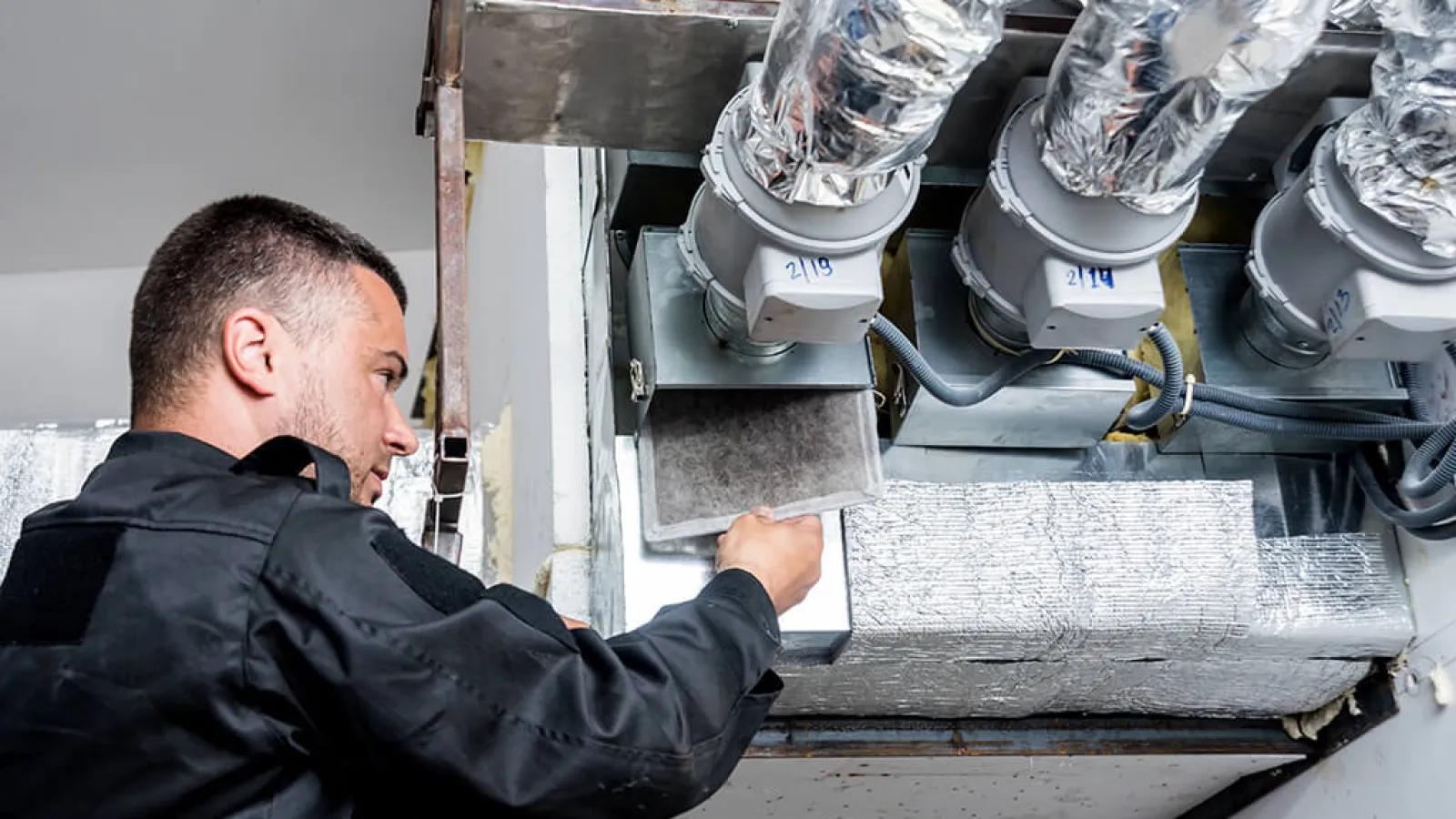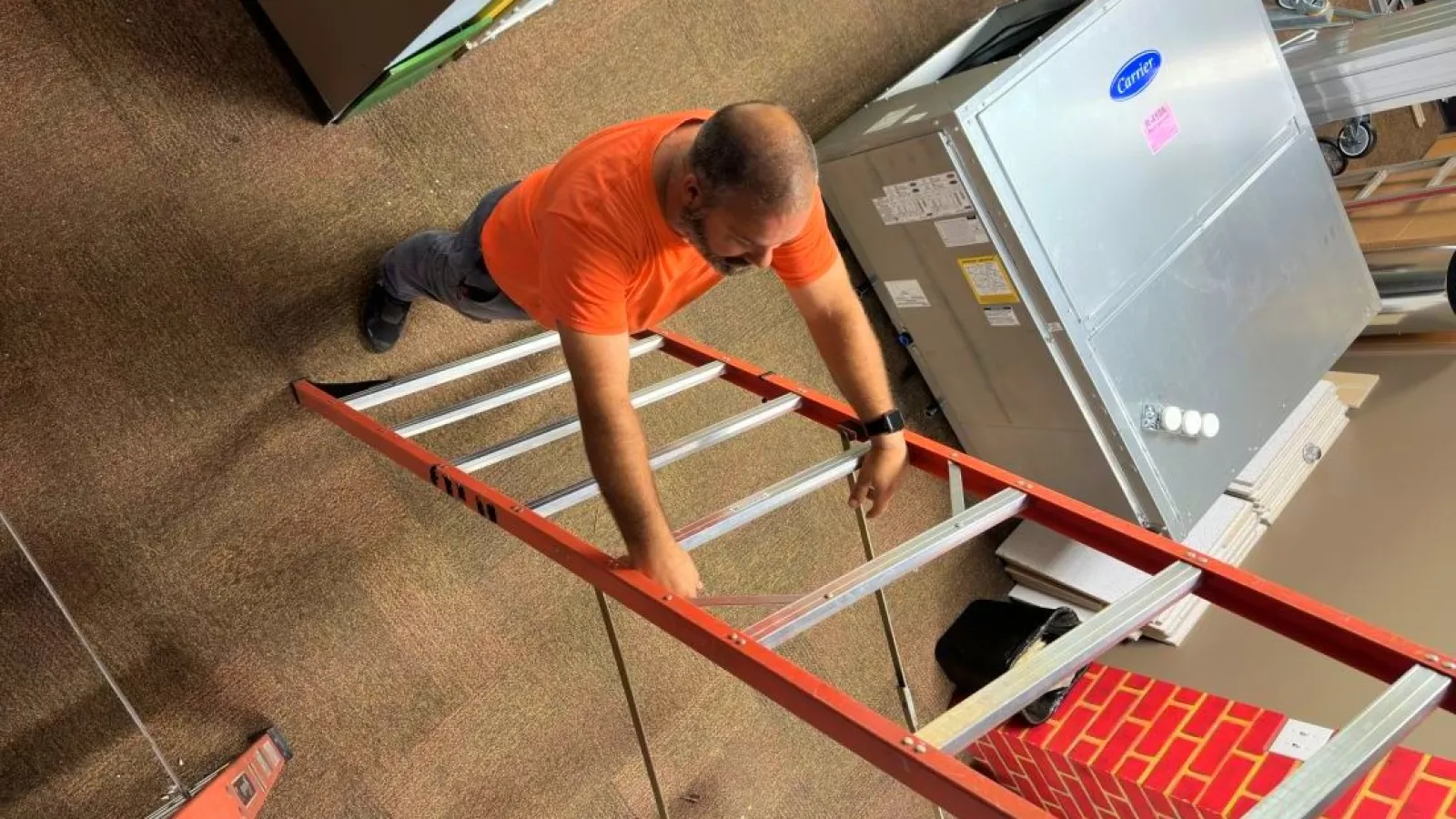Commercial heating and air systems play a critical role in both comfort and productivity. A tune up that covers our commercial HVAC maintenance checklist helps your commercial heating and cooling systems operate at peak efficiency for better performance and lower energy consumption throughout the year, as well as a decreased risk of breakdowns that impact operations. Estes Commercial offers the preventative maintenance services your Atlanta business needs for optimal performance.
Commercial HVAC Maintenance for Heating Systems
With so many different parts being included in an HVAC unit, you might accidentally leave a few parts out when working through your list of maintenance tasks for your commercial HVAC systems. Our commercial HVAC maintenance checklist for heating equipment includes many facets of your system that require regular care and inspection:
Furnace and Heating Equipment
The components of your heating system must be inspected for proper function and safe operation as part of our commercial HVAC maintenance checklist. This includes checking electrical connections throughout the system and measuring motor voltages, ignition and burner assembly inspection, heat exchanger inspection, and blower motor and fan operation. Some adjustments may need to be made before the season starts to repair malfunctioning components and improve the operation of existing ones. Also consider elements specific to your heating system’s application, such as geothermal systems or rooftop package units.
Belts
Belts within the motors of your commercial heating system are prone to slipping and wearing out over time. Check the belts for proper placement and tension. It’s also important that belts are checked for condition – if belts display cracks or warping, it’s time to replace them.
Lubrication
The moving components within a heating system experience a great deal of friction through operation. This wears the components down and causes the heating system to expend more energy as it runs. All bearings, motors, and other moving parts need regular lubrication to reduce friction and maintain their condition.
Filters
System filters require scheduled replacement to keep airborne contaminants out of inner equipment chambers where they may rest upon components and cause malfunctions or performance issues. Following the necessary filter change schedule improves airflow through the system for enhanced performance and energy efficiency throughout the heating season. This commercial HVAC maintenance checklist step is essential in both heating and cooling seasons, as well as non-peak times throughout the year.
Commercial HVAC Maintenance for Cooling Systems
HVAC maintenance for commercial cooling systems is a comprehensive inspection and tune-up for cooling components. The following key areas of your commercial cooling system are addressed through our HVAC preventative maintenance checklist:
Condensing Units
Condensing units become clogged with debris such as fallen leaves and sticks over the fall. Winter storms and temperature changes lead to ice formation on equipment and pressure on components.
Therefore, a service includes a thorough cleaning of condensing units, including condenser coils. Technicians also remove obstructions that could damage equipment during operation.
In addition, all components are checked for wear and tear, and their operation is tested during HVAC maintenance.
Wiring
Cooling system wiring is especially at risk for damage over the cold season due to rodents seeking shelter within your equipment. Techs inspect the wiring for proper connections and insulation damage, and then repair or replace if necessary.
Techs also test electrical connections so commercial cooling system components draw proper amounts of power during operation.
Refrigerant Levels
For a commercial cooling system to operate effectively, refrigerant levels must be correct. HVAC equipment and system maintenance measures refrigerant levels to detect leaks and make repairs prior to the start of the cooling season.
Once integrity is confirmed, technicians add refrigerant to the system and charge it for proper performance per the system’s specifications if necessary to complete this phase of the commercial HVAC system maintenance checklist.
Drain Lines
Cooling systems produce condensation which must drain for proper operation. Maintenance cleans drain lines and condensation drip pans of accumulated winter debris and clears any clogs.
Technicians remove mineral deposits and add algae growth-inhibiting agents if necessary to prevent the accumulation of mold and algae during the summer months.
Evaporator Coils
Debris builds up on evaporator coils as commercial cooling systems run. This buildup inhibits the cooling process and reduces the coil’s available area for heat transfer. During maintenance, your technician cleans coils and removes debris for proper performance.
Air Filters
The commercial HVAC preventative maintenance checklist addresses cooling system filters, which require changing on a regular basis. Service also includes a filter inspection and replacement, if necessary.
This allows air to flow freely through the cooling system for the best performance and efficiency. Filter changes are necessary throughout the year to maintain proper airflow and strong performance of all commercial heating and air equipment.
Additional Commercial Maintenance Points
The commercial HVAC system maintenance checklist also includes care for your indoor air quality equipment and consideration for your building automation schedules.
Change UV Light Bulbs
Depending on the model installed within your commercial heating and air system, UV light air cleaners need their bulbs changed every one to three years.
Dehumidifier Drainage Systems
If your facility has a dehumidifier, make sure its drain lines are clear. Clogs in the drainage system prevent excess moisture from flowing out. Backups lead to water damage as well as more moisture in your air.
This has the potential to cause mold growth. You do not want mold spores in your heating and cooling unit. Airborne mold spores can make people sick. For managers, this means more employees miss work.
Review Automation Schedules
With Daylight Savings Time, your building automation controls may need adjustments for proper start and stop times each spring and fall. Also, many facilities have extended summer operation hours – make sure your schedules are set to keep the workplace comfortable and operational while staffed.
Professional Solutions for Commercial HVAC Maintenance
Need assistance checking off these essential maintenance tasks? The commercial heating and air experts at Estes Commercial are happy to lend a hand. Contact us today to learn more about our commercial heating and air maintenance services for your Atlanta facility.
We provide maintenance to customers in Kennesaw, Johns Creek, Dunwoody, Marietta, Roswell, Druid Hills, Decatur, Fayetteville, Midtown and more. Let us help you tackle your commercial heating and air maintenance checklist for a successful air conditioning season. Why? Because for 70 years we’ve served home and business owners with integrity and quality customer service.


